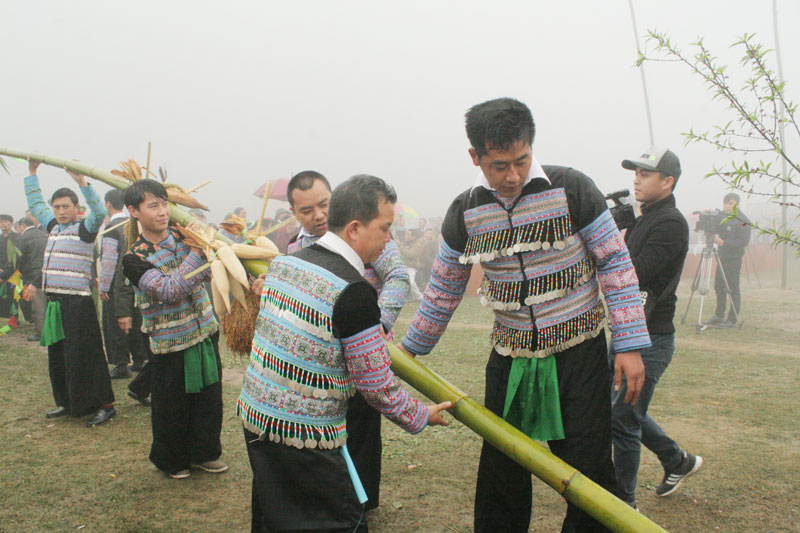
(HBO) - In the early spring, the weather was cold and mountains and forests in the northwest were covered by dim mist. We visited Hang Kia and Pa Co communes in the mountainous district of Mai Chau. Together with local people and tourists, we were immersed in the festive atmosphere of Gau Tao – a cultural symbol of the Mong ethnic group. In Mong ethnic language, Gau Tao means travelling to sacred mountain in spring to pray for blessings.

Neu tree planting ceremony - special ritual of Gau Tao festival
Neu tree during the Gau Tao festival bears the symbol of a sacred tree linking
heaven with earth, praying for the birth of children and bumper harvest. For
long when spring arrives, the Mong people often erect neu trees, considering it
a sacred symbol to avoid bad luck and bring good luck for the New Year.
According to the legend, neu tree is erected with the purpose of preventing
devils from the East Sea from entering the mainland. However, over time, the
meaning of planting neu trees during New Year and spring days has been further
spread.
During the festival, the tree is a highlight, connecting the public. Once neu
tree is erected, all activities stop, creating an absolute balance between the
old and new years. People have fun activities and ignore sorrows of the old
year. When the tree is erected, the shaman will do worship rituals under the
tree canopy to pray for good health, well-being and bumper harvest.
The Gao Tau festival has long been considered a cultural symbol of the Mong
ethnic people. It was added to the list of national intangible cultural
heritages in December 2012 by the Minister of Culture, Sports and Tourism. In
2017, for the first time, the provincial People's Committee decided to re-stage
Gau Tao festival. The Gau Tao festival of the Mong ethnic group in Pa Co
commune, Mai Chau district in 2017 was held at a stadium in Xa Linh hamlet, Pa
Co commune.
Mua A Ky from Xa Linh 1 village, Pa Co commune, over 60, was very excited to
join the festival. He said Gau Tao festival is a traditional cultural and
religious activity of the Mong people.
joining Gau Tao festival, visitors could join in a number of cultural, art and
sport activities such as Khen (pan-pipe) dancing performance in Pa Co and Hang
Kia communes. Traditional food and outstanding agro-forestry products imbued
with Mong ethnic characteristics were also introduced to visitors. Among
highlights were also the crafting of knifes and the making of traditional rice
cakes.
Following the success of Gau Tao festival 2017 in Pa Co commune, the event was
held in Hang Kia commune this year.
Gau Tao festival held in Pa Co and Hang Kia communes not only contribute to
preserving and upholding traditional cultural values of the Mong ethnic group
and popularising historic and cultural values, and typical tourist products of
Hoa Binh in general and Mai Chau district in particular./.
With an increasingly vibrant and widespread emulation movement aimed at building cultured residential areas and cultured families, Yen Thuy District has been making steady progress toward improving both the material and spiritual well-being of its people, while fostering a civilized, prosperous, beautiful, and progressive community.
Once lacking recreational spaces and community facilities, Residential Group 2 in Quynh Lam Ward (Hoa Binh City) has recently received attention for the construction of a new, spacious, and fully equipped cultural house. The project followed the model of state support combined with public contributions in both labor and funding.
The "All people unite to build cultural life" movement, which has been effectively integrated with Kim Boi district’s socio-economic development goals, is fostering a lively spirit of emulation across local residential areas, hamlets, villages, public agencies, and enterprises. In addition, through the initiative, traditional cultural values are being preserved and promoted, while community solidarity and mutual support in poverty reduction and economic development are being strengthened.
A working delegation of the Hoa Binh provincial People’s Committee led by its Permanent Vice Chairman Nguyen Van Toan on June 11 inspected the progress of a project to build the Mo Muong Cultural Heritage Conservation Space linked to tourism services in Hop Phong commune, Cao Phong district.
Born and growing in the heroic land of Muong Dong, Dinh Thi Kieu Dung, a resident in Bo town of Kim Boi district, in her childhood was nurtured by the sweet lullabies of her grandmother and mother. These melodies deeply imprinted on her soul, becoming an inseparable part of her love for her ethnic group's culture. For over 20 years, this love for her hometown has driven Dung to research, collect, and pass down the cultural values of the Muong people to future generations.
In the final days of May, the Ethnic Art Troupe of Hoa Binh Province organized performances to serve the people in remote, mountainous, and particularly disadvantaged areas within the province. These were not just ordinary artistic shows, but they were the meaningful journeys aimed at spreading cultural values, enhancing the spiritual life of the people and contributing to the preservation of ethnic minority cultural identities.



